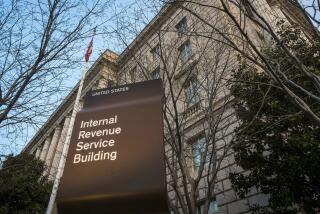$8.5-Billion Estimate Disputed : Matsui Sees Little Gain in One-Time Tax Amnesty
- Share via
WASHINGTON — A study by Congress’ Joint Taxation Committee is expected to show that a one-time tax amnesty, which is being promoted as a way to reduce the deficit, would garner less than one-eighth of the revenues projected by its proponents, Rep. Robert T. Matsui (D-Sacramento) said Friday.
The committee, which is still in the process of making its estimates, has said informally that it is likely to project that a federal amnesty would bring in $1 billion at most, Matsui said. Such a projection would be far short of the $8.5-billion estimate being used by the Senate Budget Committee as it considers drawing up its spending proposal.
The committee is basing its estimate on figures provided by the National Taxpayers Union, which vigorously supports the amnesty proposal. The estimate assumes that the amnesty would be accompanied by stricter enforcement of existing tax laws.
Disappointing Results
Matsui said studies by a number of independent economists are showing that a federal amnesty would have disappointing results. Such conclusions may take the steam out of what appears to be a strengthening drive for a federal version of the tax amnesties that have reaped impressive amounts of revenue in more than a dozen states in the last few years.
Under such programs, delinquent taxpayers are offered an opportunity to come forward and pay back taxes with no penalty. The idea has grown politically appealing to lawmakers seeking the least painful means of slashing the federal deficit enough to meet the $144-billion target imposed by the Gramm-Rudman budget-balancing law.
However, critics contend that a federal amnesty would not be as effective as the state programs, in part because taxpayers are more apt to keep up their federal tax payments.
Some add that such amnesty may even dampen the willingness of taxpayers to continue complying with the law.
‘It’s Irresponsible’
“What you’re basically doing is sending a signal out there that you can cheat and get away with it,” Matsui said. “I think it’s irresponsible to raise the issue six weeks before you are supposed to file your income taxes.”
Joseph Pechman, a tax specialist at the Brookings Institution, said his preliminary studies of national income show that estimates of the potential back taxes that could be collected under an amnesty--some of which have exceeded $20 billion--are “overstated by a substantial amount.”
Matsui, who predicted that Congress will reject the idea of a tax amnesty, said federal lawmakers would bring in more revenue if they tightened tax-compliance measures. However, he noted that recent efforts to do so, such as requiring detailed logs of business mileage and withholding taxes and dividends, have met such resistance that they have been repealed.
More to Read
Sign up for Essential California
The most important California stories and recommendations in your inbox every morning.
You may occasionally receive promotional content from the Los Angeles Times.













